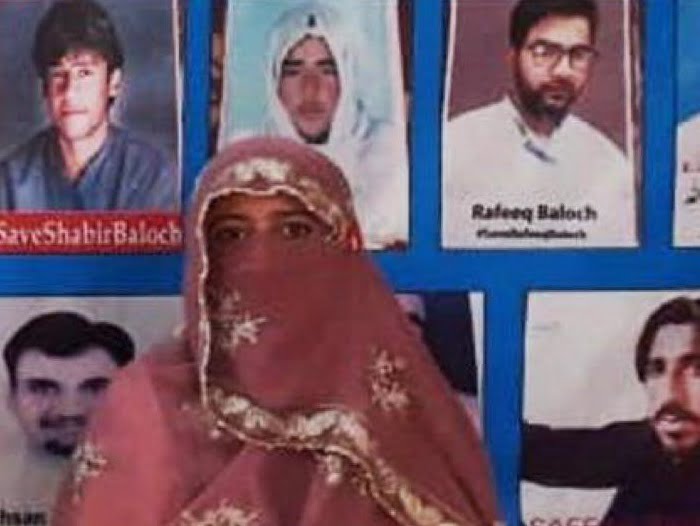A video of a young Baloch woman, Hani Gul, is making rounds on the social media in which she accuses officials of Pakistan’s premier intelligence agency, ISI, of torturing her and her fiancé at a secret detention center for months.
Gul, who appears to be in her 20s, says she and Mohammad Naseem, to whom she is engaged, were arrested five months ago in Karachi where they were staying as students. Both originally belong to Balochistan’s now famous port city of Gwadar where China is building a controversial deep seaport and related projects to advance its regional ambitions.
“I was kept there for three months and it has been five months that Naseem is under their (custody),” she says in a video taken in front of the Quetta Press Club where dozens of relatives of forcibly disappeared Baloch activists are protesting for the recovery of their loved ones.
Since 2004, thousands of Baloch politicians, human rights activists, journalists, writers, poets and teachers have been picked up in military raids and tortured at secret military detention centers for months and often for years. Hundreds of such victims, since 2009, have appeared dead in Balochistan’s sparsely populated plains and mountains.
Relatives of victims, Amnesty International, Human Rights Watch, and Pakistan’s own independent watchdog Human Rights Commission of Pakistan have often blamed the country’s powerful military establishment of such enforced disappearances and kill and dump operations in the resource-rich but backward Balochistan region.
Pakistan’s paramilitary force Frontier Corps has been allowed immense political and administrative powers in Balochistan to curb a Baloch separatist movement which, in part, is violent. Separatist militant groups, demanding self-rule, have launched successive attacks on government installations and Chinese assets working on the mega China-Pakistan Economic Corridor projects.
In October 2017, army personnel arrested close female family members of two key Baloch militant leaders, Dr Allah Nazar and Aslam Baloch who was later killed in a suicide attack in Afghanistan. Since then, an increasing number of cases have surfaced in the media and human rights groups’ report where women and children are picked up by the military and kept in secret detention to use them as a leverage against politically and militarily active Baloch nationalists.
Gul says she and Naseem were arrested on May 14.
“They tortured us. They were ISI people. I can recognize their faces if I see them,” Gul says in the video. “They wanted us to admit that we had links with separatist militants, with BLF (Balochistan Liberation Front).”
Some local websites initially reported she was raped during custody, which is not true. The confusion arose because of a Balochi word for torture which can also metaphorically mean rape.
Abdullah Abbas, a Europe-based Baloch human rights activists, who talked to Hani Gul on phone, told Balochistan Times that some people read more into her words. “She meant she was tortured. I talked to her personally and she confirmed that she was not raped.”
Gul was released on August 14, but Naseem still remains in military custody and his whereabout are unknown to Gul or the country’s civil law enforcement agencies. Gul has filed a petition with the Sindh High Court against Naseem’s “illegal detention” and she has a hearing on September 23.



